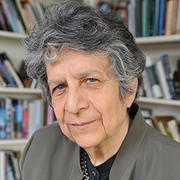
Throughout her academic career, Leila Ahmed, HDS's Victor S. Thomas Professor of Divinity, has labored to understand the history of women and gender in Islam.
Her scholarship has earned her the admiration of her colleagues. Her candor and skill as a writer has earned her the praise of critics. This year, her work as a teacher and mentor has earned her the recognition of the School's alumni as a recipient of the 2015 Peter J. Gomes STB '68 Memorial Honors.
"It is truly a tremendous honor," she says. "It is particularly wonderful to celebrate the Reverend Professor Peter Gomes, a good friend of many years and someone that I, like so many of us, deeply appreciated and admired. It was thrilling, too, to find myself named alongside such a distinguished set of alumni."
Ahmed's books, which include Women and Gender in Islam: The Historical Roots of a Modern Debate and the Grawemeyer Award-winning A Quiet Revolution: The Veil's Resurgence, from the Middle East to America, have changed the way that scholars around the world think about gender and Islam.
In so doing, the Egyptian-American has not shied away from talking about her own lived experience. In her memoir, A Border Passage: From Cairo to America—A Woman's Journey, she describes growing up in an era when Muslims, Jews, and Christians were neighbors, friends, and colleagues and part of cordially intermingling communities—in Cairo and Alexandria in particular.
Hard times set in after the Egyptian revolution of 1952. Ahmed's father, an engineer, took a firm stand against then-President Gamal Abdel Nasser's pet project, the construction of the Aswan High Dam, which he believed would be ecologically disastrous for Egypt.
His stand angered Nasser and resulted in her father's marginalization. By then, Ahmed, who had attended a British school in Egypt, was pursuing her undergraduate studies at the University of Cambridge. Going on to earn her PhD, she embarked on a career in academia that eventually brought her to the University of Massachusetts at Amherst, where she taught in the women's studies and Near Eastern studies programs, serving also for a time as director of each.
In 1998, impressed by her scholarship, HDS came calling. Ahmed says she had no reservations about being the first Muslim woman to join the HDS faculty, traditionally known for its strength in the study of Christianity. In fact, she had no idea at the time that she was the first Muslim woman at HDS. She only knew that the School was renowned for its outstanding students as well as for the pioneering research of its scholars.
"It has really been a great gift," she said, "to be part of this remarkable community."
—by Paul Massari
